Tartar buildup is a common dental problem that affects many people. Tartar is hardened plaque that forms on teeth and can lead to gum disease and other oral health issues if left untreated. While a visit to the dentist is the best way to remove tartar, there are also some effective ways to remove it at home without a dentist.
Regular brushing and flossing are the best ways to prevent tartar buildup. However, if tartar has already formed, there are some home remedies that can help remove it. Some of these remedies include using natural ingredients like white vinegar, baking soda, and hydrogen peroxide. It is important to note that these remedies should be used with caution and under the guidance of a dental professional.
In this article, we will explore some effective ways to remove tartar from teeth without a dentist. We will also discuss the causes of tartar buildup, how to prevent it, and when it is necessary to seek professional dental care. By following these tips and maintaining good oral hygiene practices, you can prevent and remove tartar buildup and maintain healthy teeth and gums.
Understanding Tartar and Plaque
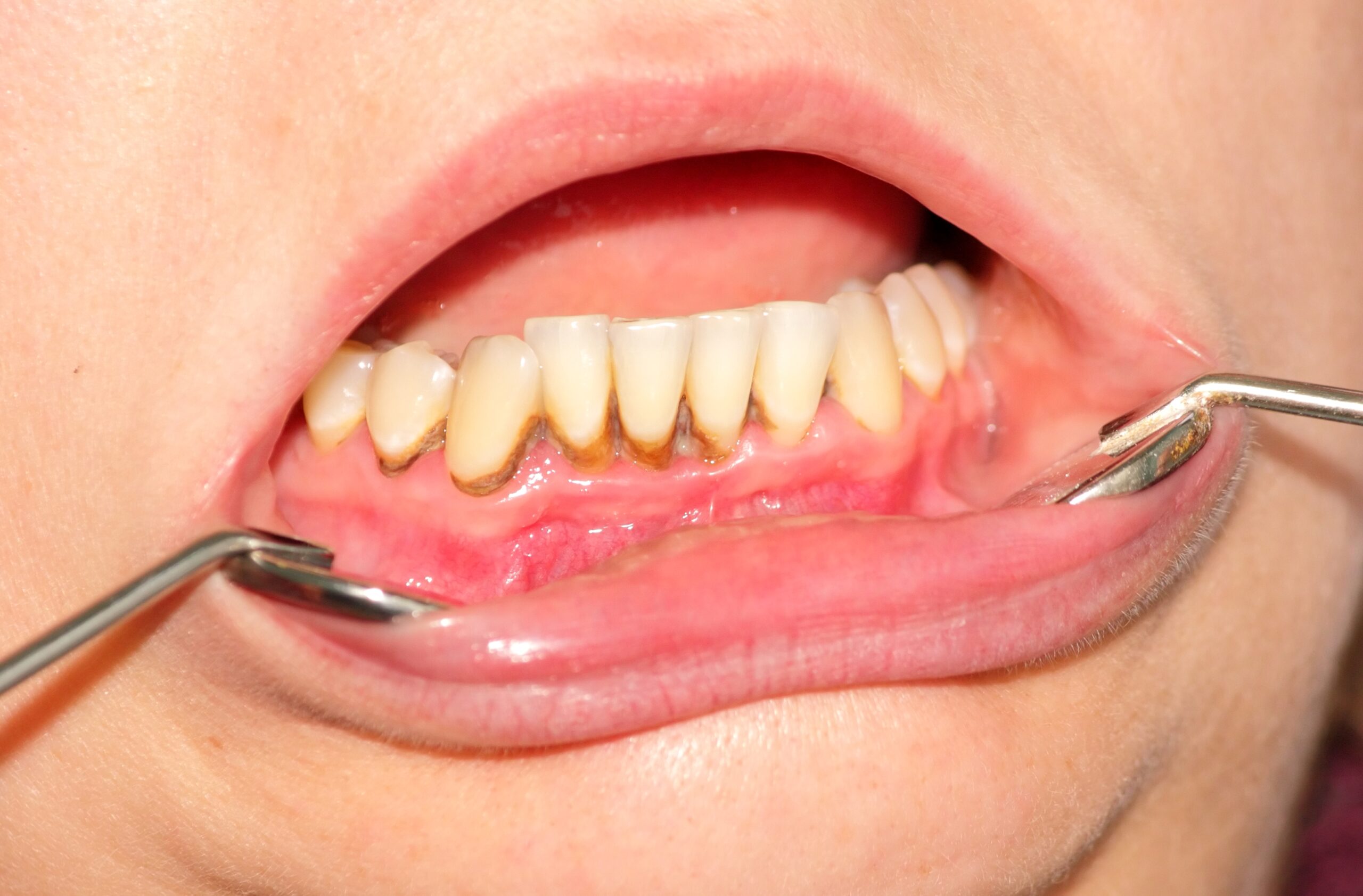
Tartar and plaque are two common dental issues that can lead to gum disease and other oral health problems. Both are caused by bacteria that live in your mouth.
Plaque
Plaque is a soft, sticky film of bacteria that forms on your teeth and gums. It is usually colorless or yellowish in appearance. Plaque is formed when the bacteria in your mouth combine with food particles and saliva. If not removed by regular brushing and flossing, plaque can harden into tartar.
Tartar
Tartar, also known as calculus, is hardened dental plaque. It is a yellow or brown color and can form both above and below the gum line. Tartar is more difficult to remove than plaque and can only be removed by a dentist or hygienist.
Bacteria
Both plaque and tartar are caused by bacteria that live in your mouth. These bacteria feed on the food particles in your mouth and produce acid, which can erode your tooth enamel and lead to cavities. Bacteria can also irritate your gums, leading to inflammation and gum disease.
Dental Plaque
Dental plaque is another term for the soft, sticky film of bacteria that forms on your teeth and gums. It is the precursor to tartar and can be removed by regular brushing and flossing. If not removed, it can harden into tartar and lead to more serious oral health problems.
In summary, tartar and plaque are caused by bacteria that live in your mouth and feed on food particles. Plaque is a soft, sticky film that can harden into tartar if not removed by regular brushing and flossing. Tartar is a hardened form of plaque that can only be removed by a dentist or hygienist. Regular dental cleanings and good oral hygiene practices can help prevent the buildup of tartar and plaque and maintain good oral health.
The Importance of Oral Health
Oral health is an essential aspect of overall health. Neglecting oral hygiene can lead to various health issues, including gum disease, tooth decay, and even heart disease, diabetes, stroke, and dementia. Therefore, it is vital to maintain good oral hygiene to prevent these health problems.
Healthy gums are crucial for maintaining healthy teeth. Gum disease, also known as gingivitis, is a common condition that affects many people. It is caused by the buildup of plaque on the teeth, which can irritate the gums and cause inflammation. If left untreated, gingivitis can lead to more severe gum disease, which can cause tooth loss.
Cavities are another common dental problem caused by tooth decay. Tooth decay occurs when the enamel, the outer layer of the tooth, is damaged by bacteria and acids. If left untreated, cavities can lead to tooth loss, pain, and infection.
Maintaining good oral hygiene can also have a positive impact on your immune system. Poor oral health can lead to an increase in harmful bacteria in the mouth, which can weaken the immune system and make it more challenging to fight off infections.
In conclusion, oral health is a critical aspect of overall health. By maintaining good oral hygiene, you can prevent gum disease, cavities, and other dental problems. It can also have a positive impact on your immune system and help prevent more severe health problems.
Recognizing Tartar Buildup
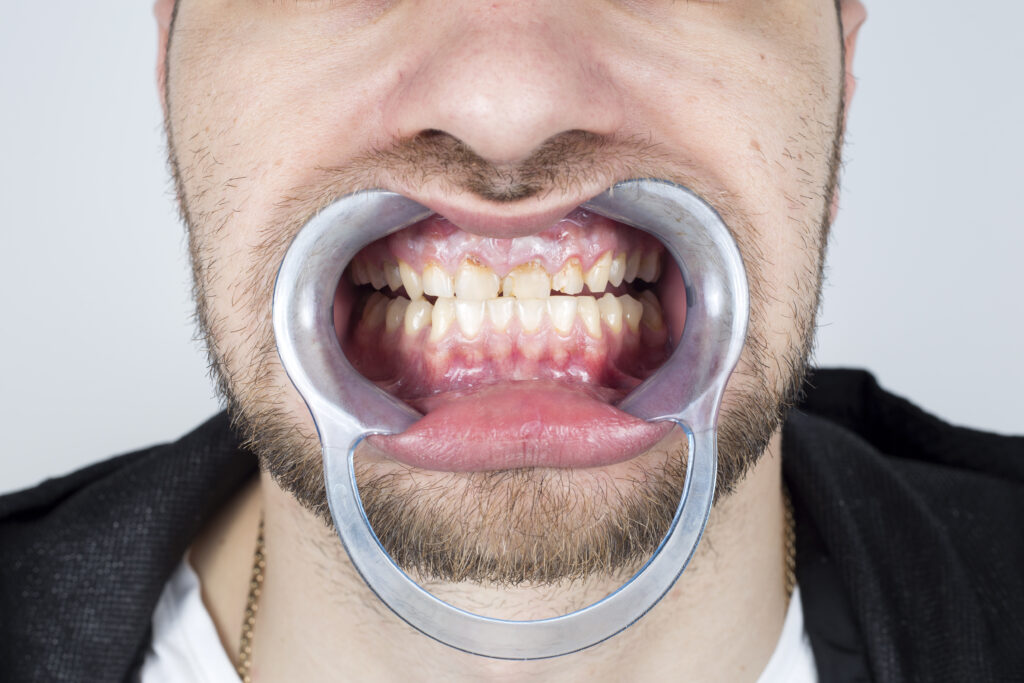
Tartar buildup is a common dental problem that can lead to gum disease and tooth decay. It is a hard, rough substance that forms on teeth when plaque is left to accumulate and harden. Tartar buildup can range in color from tan to brown or yellow, and it often forms along the gum line.
There are several signs of tartar buildup that you can look out for. One of the most obvious signs is the appearance of stains on your teeth. These stains can be caused by the buildup of tartar and can be difficult to remove with regular brushing and flossing.
Another sign of tartar buildup is the rough texture of your teeth. If your teeth feel rough or gritty, this may be a sign that tartar has formed on the surface. You may also notice that your teeth feel more sensitive than usual, especially to hot or cold temperatures.
If you notice any of these signs, it is important to take action to remove the tartar buildup. Regular brushing and flossing can help prevent tartar from forming, but once it has hardened, it can only be removed by a dentist or dental hygienist.
Fortunately, there are also several home remedies that you can try to help remove tartar from your teeth. These include using baking soda toothpaste, oil pulling, and water flossing. By incorporating these techniques into your oral hygiene routine, you can help prevent tartar buildup and keep your teeth healthy and strong.
Preventing Tartar Formation
Preventing tartar formation is the best way to avoid the need to remove it. The following tips can help you keep your teeth clean and healthy:
- Brush your teeth at least twice a day with fluoride toothpaste. Use a soft-bristled toothbrush and brush for at least two minutes each time.
- Floss your teeth at least once a day to remove plaque and food particles from between your teeth and along your gum line. Dental floss or an electric water flosser can be used.
- Use an antiseptic mouthwash to kill bacteria and freshen your breath. Be sure to follow the manufacturer’s instructions and avoid swallowing the mouthwash.
- Drink plenty of water throughout the day to help wash away food particles and bacteria. Water also helps keep your mouth hydrated and your saliva flowing, which helps prevent tooth decay.
- Eat a balanced diet that is rich in fresh fruits and vegetables. Avoid sugary foods and drinks as much as possible, as they can contribute to the formation of plaque and tartar.
- Consider using a water flosser in addition to regular flossing to help remove plaque and food particles from hard-to-reach areas of your mouth.
- Make sure to visit your dentist regularly for checkups and professional cleanings. Your dentist can help you develop an oral health routine that is tailored to your individual needs.
By following these tips, you can help keep your teeth clean and healthy and prevent the formation of tartar.
Home Remedies for Tartar Removal
Tartar buildup can be a frustrating dental problem, but there are several home remedies that can help remove it. While these remedies are not a substitute for professional dental cleanings, they can help prevent further tartar buildup and promote good oral hygiene.
Brushing with Baking Soda Toothpaste
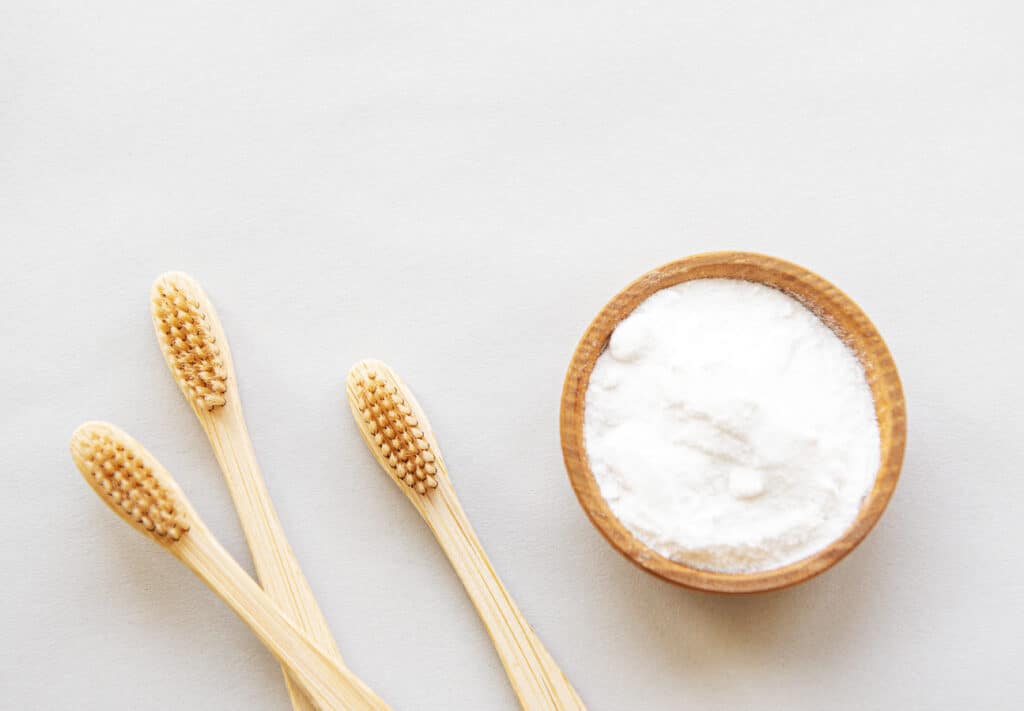
Baking soda is a natural abrasive that can help remove tartar from teeth. You can make your own baking soda toothpaste by mixing baking soda with water until it forms a paste. Brush your teeth with this paste twice a day to help remove tartar buildup.
Rinsing with Vinegar
Vinegar is a natural acid that can help dissolve tartar buildup. Mix two tablespoons of white vinegar with one tablespoon of salt in a cup of warm water. Rinse your mouth with this solution for 30 seconds, then spit it out. Repeat this process twice a day to help remove tartar.
Applying Aloe Vera Gel
Aloe vera has antibacterial properties that can help prevent tartar buildup. Apply aloe vera gel to your teeth and gums, then brush your teeth as usual. Repeat this process twice a day to help remove tartar and promote good oral health.
Chewing Sesame Seeds
Sesame seeds can help remove tartar from teeth by acting as a natural scrub. Chew a handful of sesame seeds thoroughly, then brush your teeth with a dry toothbrush. Repeat this process twice a week to help remove tartar.
Rubbing Orange Peel
Orange peel contains vitamin C and other nutrients that can help prevent tartar buildup. Rub the inside of an orange peel on your teeth and gums, then brush your teeth as usual. Repeat this process twice a day to help remove tartar and promote good oral health.
Using Glycerin
Glycerin can help loosen tartar buildup and prevent it from sticking to teeth. Mix one tablespoon of glycerin with one tablespoon of salt in a cup of warm water. Rinse your mouth with this solution for 30 seconds, then spit it out. Repeat this process twice a day to help remove tartar.
Oil Pulling with Coconut Oil
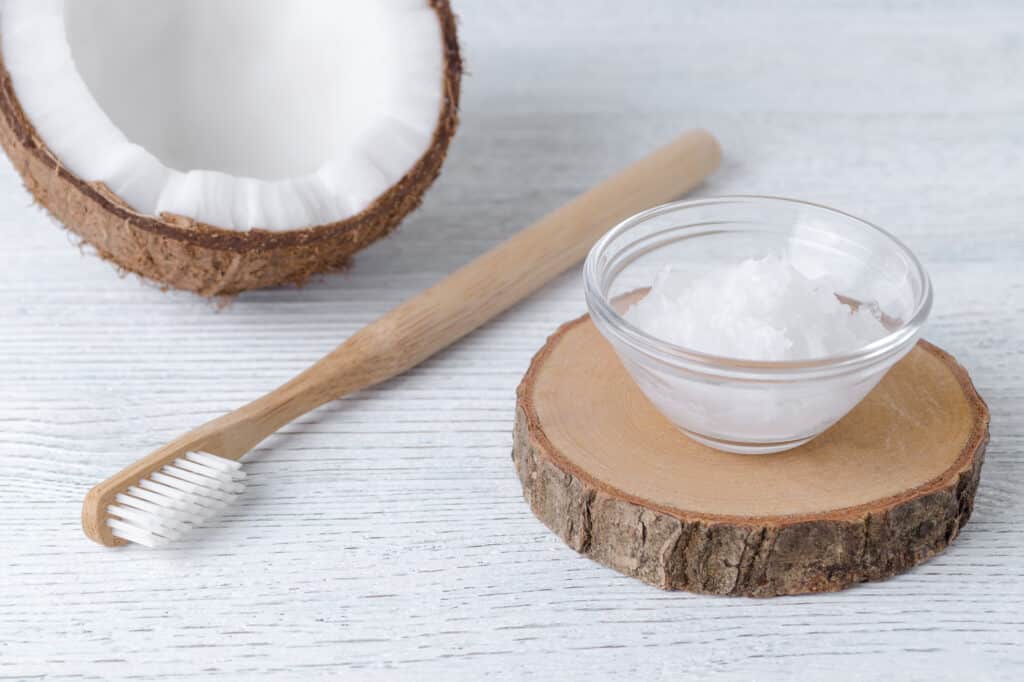
Oil pulling involves swishing oil around in your mouth to remove bacteria and promote good oral health. Coconut oil is a popular oil for oil pulling, as it has antibacterial properties that can help prevent tartar buildup. Swish one tablespoon of coconut oil around in your mouth for 15-20 minutes, then spit it out. Repeat this process once a day to help remove tartar and promote good oral health.
Mashing Strawberries
Strawberries contain malic acid, which can help remove tartar from teeth. Mash one ripe strawberry into a paste, then apply it to your teeth and gums. Leave it on for five minutes, then rinse your mouth with warm water. Repeat this process once a week to help remove tartar and promote good oral health.
In conclusion, these home remedies can help remove tartar from teeth and promote good oral health. However, it is important to note that these remedies are not a substitute for professional dental cleanings. If you have severe tartar buildup or other dental problems, it is important to see a dentist for treatment.
Professional Dental Cleaning
While there are several home remedies to remove tartar from teeth, professional dental cleaning is the most effective way to get rid of tartar buildup. A dental professional, such as a dentist or dental hygienist, can perform a dental clean to remove tartar and plaque from teeth.
According to the American Dental Association, dental cleaning, also known as scaling, is the process of removing tartar and plaque buildup from teeth and gums. During a dental clean, a dental professional will use special tools to scrape off tartar and plaque from teeth. They may also use an ultrasonic tool that vibrates to loosen and remove tartar buildup.
It is recommended to get a professional dental cleaning every six months to maintain good oral health. However, if you have a history of gum disease or tartar buildup, your dentist may recommend more frequent cleanings.
It is important to note that attempting to remove tartar from teeth without a dentist can actually damage your teeth and make you more susceptible to cavities and other dental issues. Therefore, it is recommended to visit a dental professional for a dental clean to ensure that your teeth and gums remain healthy.
Impact of Lifestyle and Diet on Tartar Buildup
Tartar buildup can be caused by a variety of factors, including poor oral hygiene, genetics, and certain lifestyle choices and dietary habits. In this section, we will explore how smoking, pigmented beverages, saliva, inflammation, receding gums, tooth loss, tooth sensitivity, bone loss, periodontal disease, and periodontitis can impact tartar buildup.
Smoking
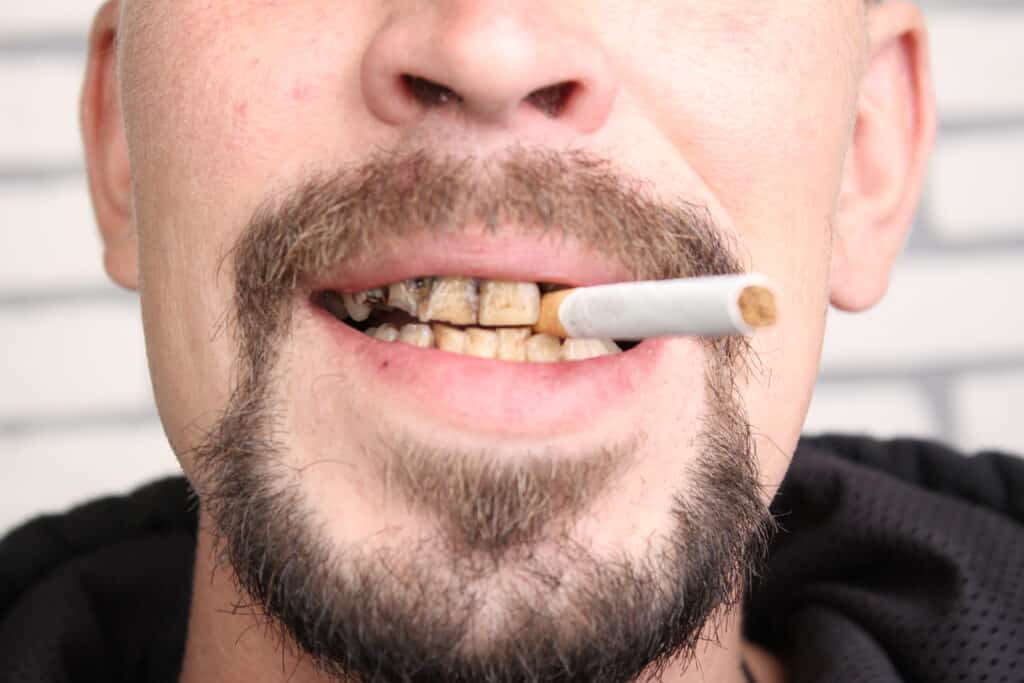
Smoking is a major risk factor for tartar buildup and other oral health problems. It can cause inflammation and damage to the gums, which can lead to the formation of tartar. Additionally, smoking can also reduce saliva production, which can make it more difficult for the body to naturally remove tartar from the teeth.
Pigmented Beverages
Beverages like coffee, tea, and red wine can stain the teeth and contribute to the formation of tartar. These pigmented beverages contain chromogens, which are compounds that can adhere to the enamel of the teeth and cause discoloration. Additionally, these beverages can also be acidic, which can erode the enamel and make it easier for tartar to form.
Saliva
Saliva plays an important role in maintaining oral health. It helps to neutralize acids in the mouth, wash away food particles and bacteria, and remineralize the teeth. However, certain medications, medical conditions, and lifestyle habits can reduce saliva production, which can increase the risk of tartar buildup.
Inflammation
Inflammation in the gums can lead to the formation of tartar. When the gums become inflamed, they can pull away from the teeth, creating pockets where bacteria can accumulate and form tartar. Additionally, inflammation can also weaken the supporting structures of the teeth, leading to tooth loss and bone loss.
Receding Gums
Receding gums can also contribute to tartar buildup. When the gums recede, the roots of the teeth become exposed, making it easier for bacteria to accumulate and form tartar. Additionally, receding gums can also lead to tooth sensitivity and increase the risk of tooth loss.
Tooth Loss
Tooth loss can also increase the risk of tartar buildup. When a tooth is missing, the surrounding teeth can shift out of place, creating gaps where bacteria can accumulate and form tartar. Additionally, tooth loss can also lead to bone loss, which can weaken the supporting structures of the teeth and increase the risk of tartar buildup.
Tooth Sensitivity
Tooth sensitivity can be a sign of tartar buildup. When tartar forms on the teeth, it can create pockets where bacteria can accumulate and irritate the nerves of the teeth, causing sensitivity. Additionally, tartar can also erode the enamel of the teeth, making them more sensitive to hot and cold temperatures.
Bone Loss
Bone loss can also contribute to tartar buildup. When the supporting structures of the teeth are weakened, it can create pockets where bacteria can accumulate and form tartar. Additionally, bone loss can also lead to tooth loss, which can further increase the risk of tartar buildup.
Periodontal Disease
Periodontal disease is a serious gum infection that can lead to the formation of tartar. When bacteria accumulate in the pockets between the teeth and gums, they can cause inflammation and damage to the supporting structures of the teeth, leading to tartar buildup and tooth loss. Additionally, periodontal disease can also increase the risk of other health problems, such as heart disease and diabetes.
Periodontitis
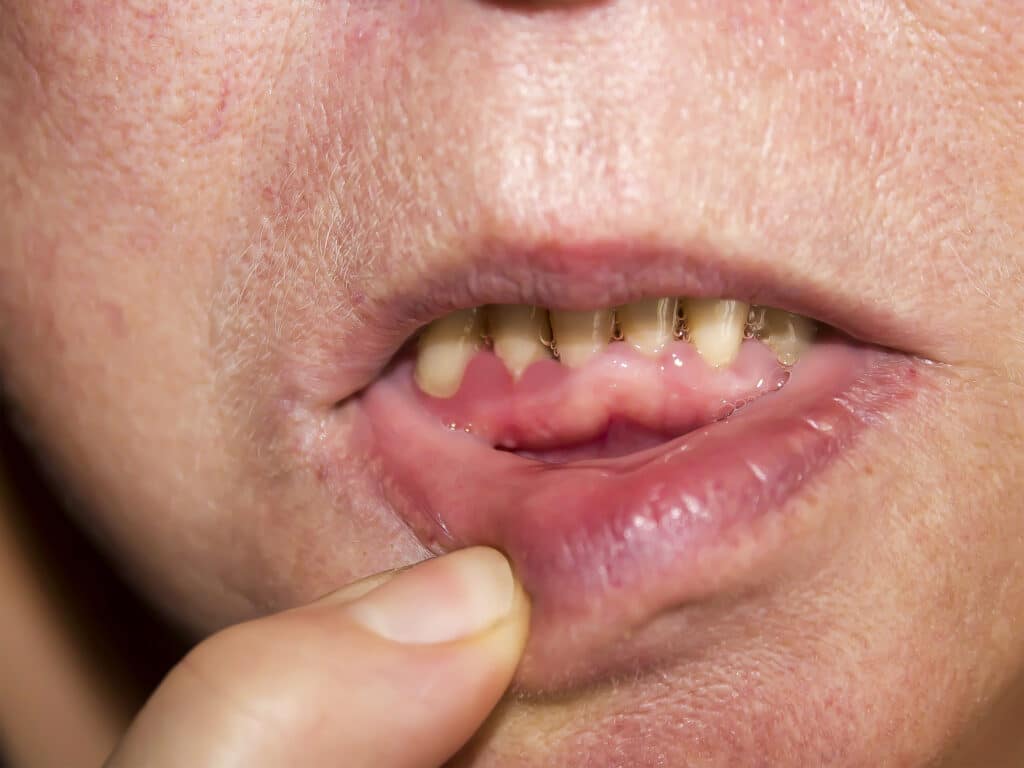
Periodontitis is a severe form of periodontal disease that can cause the gums to pull away from the teeth, creating deep pockets where bacteria can accumulate and form tartar. It can also cause bone loss and tooth loss, leading to further complications. If left untreated, periodontitis can cause significant damage to the teeth and gums, so it is important to seek treatment as soon as possible.
Conclusion
In conclusion, removing tartar from teeth without a dentist is possible but requires consistent effort and a good oral hygiene routine. Brushing twice a day with a fluoride toothpaste and flossing daily are essential steps in preventing tartar buildup. Additionally, using mouthwash can help kill bacteria and freshen breath.
There are also several natural remedies that can help remove tartar. For example, rubbing a mixture of baking soda and water on teeth can help remove surface stains and plaque. Another option is to use a mixture of white vinegar and water to rinse the mouth, which can help remove tartar and promote demineralization of tooth enamel.
It’s important to note that while these methods can be effective in removing tartar, they may not be as effective as a professional cleaning by a dentist. Regular dental checkups and cleanings are important for maintaining good oral health and preventing gum disease.
Overall, taking care of your teeth and gums is essential for preventing tartar buildup and maintaining good oral health. By following a consistent oral hygiene routine and using natural remedies, you can help remove tartar from your teeth and prevent future buildup.



